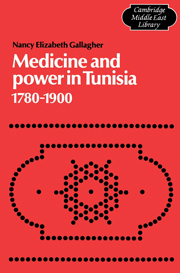Book contents
- Frontmatter
- Contents
- Illustrations
- Acknowledgments
- Note on transliteration
- Abbreviations
- Introduction
- 1 Indigenous medicine against plague, 1780–1830
- 2 Cholera in an age of European economic expansion, 1830–58
- 3 Cholera, typhus, and economic collapse, 1858–70
- 4 Colonization and collapse of Arab medical institutions
- Conclusion
- APPENDIX A Waqf (hubus) document for the maristan of Tunis
- APPENDIX B Letter from Husayn Bey to de Lesseps on reasons for the quarantine
- APPENDIX C Epidemics and population trends
- Notes
- Glossary
- Bibliography
- Index
4 - Colonization and collapse of Arab medical institutions
Published online by Cambridge University Press: 23 November 2009
- Frontmatter
- Contents
- Illustrations
- Acknowledgments
- Note on transliteration
- Abbreviations
- Introduction
- 1 Indigenous medicine against plague, 1780–1830
- 2 Cholera in an age of European economic expansion, 1830–58
- 3 Cholera, typhus, and economic collapse, 1858–70
- 4 Colonization and collapse of Arab medical institutions
- Conclusion
- APPENDIX A Waqf (hubus) document for the maristan of Tunis
- APPENDIX B Letter from Husayn Bey to de Lesseps on reasons for the quarantine
- APPENDIX C Epidemics and population trends
- Notes
- Glossary
- Bibliography
- Index
Summary
Throughout the years of the plague and cholera epidemics, Muslim doctors continued to serve the majority of the population. Most were unlicensed empirics who had learned their trade from apprenticeships or experience. Until the early 1860s, however, the amin al-atibba’ continued to issue ijazas to applicants, usually in exchange for written proof of experience and a small fee. The amin continued in his role as head of the maristan, which remained the only Muslim hospital in Tunis. The authority of the Muslim amin diminished in the 1860s and 1870s until the last non-European-trained amin died in 1876. But the choice of medical systems had long become clear – European medicine was officially to prevail. The only questions were under whose authority and in what form. Were the reforms to take place under beylical authority or under a colonial government, and were the medical authorities to be European-trained Muslims or Europeans themselves? And if they were to be the latter, would they be Italian, British or French officials?
Transition from Muslim to European medical authority
The indigenous medical institutions continued to function until the middle of the nineteenth century. The bey's European doctor was still responsible only to the court while the Muslim amin al-atibba’ or the bey himself was in charge of licensing the indigenous doctors. Ijazas are preserved in the government archives issued by Ahmad Bey in 1840 to indigenous doctors; the last one is dated 1861 and was issued by Muhammad al-Sadiq Bey.
- Type
- Chapter
- Information
- Medicine and Power in Tunisia, 1780–1900 , pp. 83 - 96Publisher: Cambridge University PressPrint publication year: 1983



